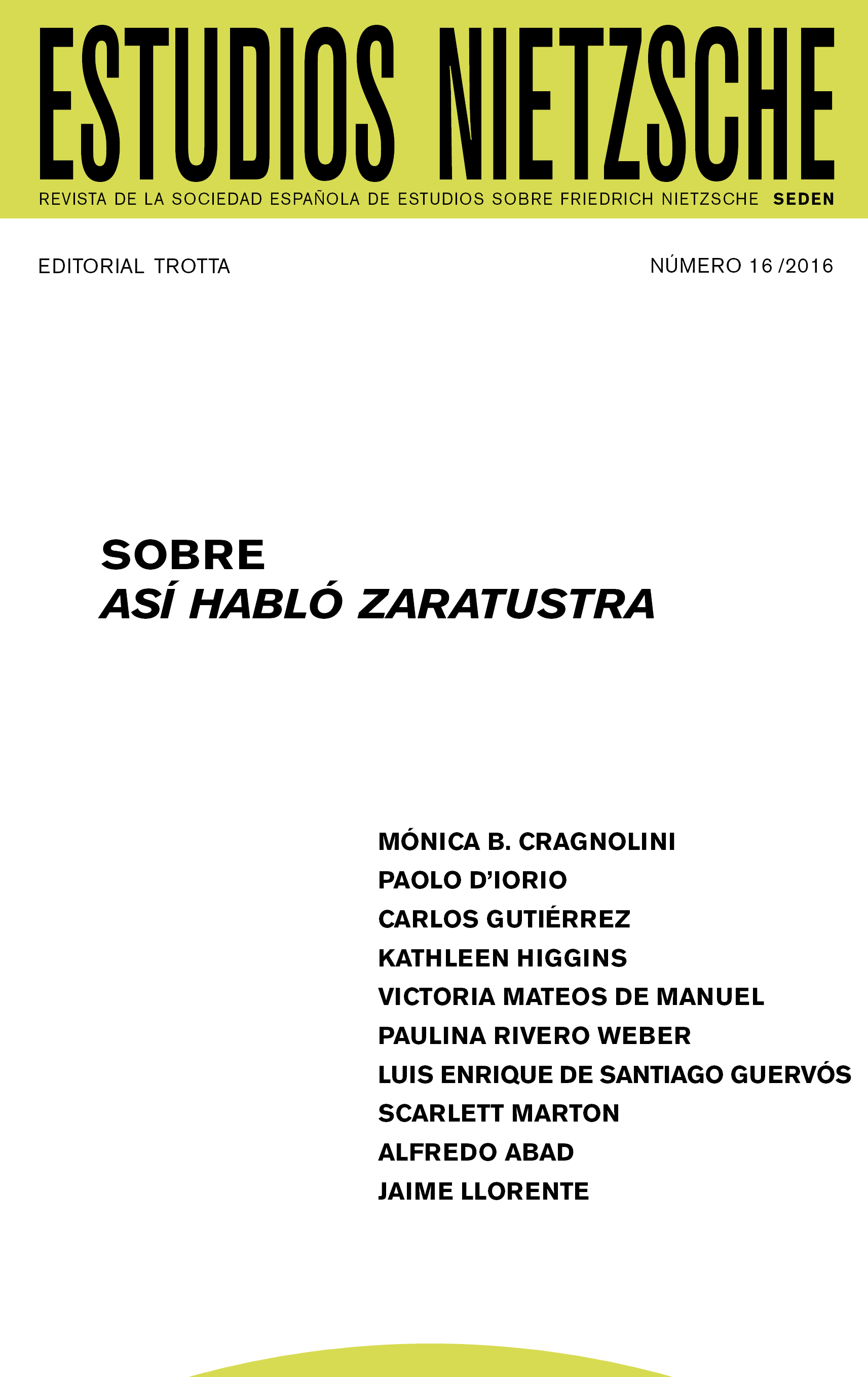Nietzsche and the reactive valuation of the temporal: the axiological paradoxes of eternal recurrence of the same
DOI:
https://doi.org/10.24310/EstudiosNIETen.vi16.10822Keywords:
becoming, will to power, quanta, temporalityAbstract
The thought of eternal recurrence of the same constitutes the highest expression of Nietzsche’s intuitions in reference to the structure of time and history. In the present study we try to suggest, in the first place, an interpretation of the underlying ontological roots to Nietzsche’s conception of temporality (roots to be found in the structure itself of will to power). Such interpretation would then allow us to show the way in which
it is possible, from an axiological point of view, to consider «the doctrine of recurrence» as a symptom of a hidden reactive valuation of temporal becoming.
Downloads
Metrics
References
Fink, E. La filosofía de Nietzsche, tr. A. Sánchez Pascual, Madrid: Alianza, 1989.
Granier, J., Le problème de la Vérité dans la philosophie de Nietzsche, París: Seuil, 1966.
Heidegger, M., Nietzsche, ed. J. L. Vermal, 2 vols., Barcelona: Destino, 2000.
M. Cacciari, M., Desde Nietzsche: Tiempo, arte, política, tr. M. B. Cragnolini y A. Paternostro, Buenos Aires: Biblos, 1994.
Nietzsche, F., Obras Completas, I-IV (OC ). Director ed. Diego Sánchez Meca. Madrid: Tecnos, 2011-2016
Nietzsche, F., Correspondencia I-VI. (CO). Director ed. Luis E. de Santiago Guervós. Madrid : Trotta, 2005- 2012.
Nietzsche, F., Fragmentos Póstumos I-IV (FP). Director ed. Diego Sánchez Meca. Madrid: Tecnos, 2006-2010.
Reboul, O, Nietzsche, crítico de Kant, tr. J. Quesada y J. Lasaga, Barcelona: Anthropos, 1993.
Schiller, F., Sämmtliche Werke, Band 4, München: Hanser, 1962.
Vattimo, G., Introducción a Nietzsche, tr. J. Binaghi, Barcelona: Península, 1990.
Downloads
Published
How to Cite
Issue
Section
License

This work is licensed under a Creative Commons Attribution-NonCommercial-ShareAlike 4.0 International License.
As of issue 21 (2021) this journal is published only in open access (diamond route).
From that number 21, like the previous numbers published in NIETZSCHE STUDIES, they are subject to the Creative Commons Acknowledgment-NoComercia-ShareIgual 4.0 license, the full text of which can be consulted at <http://creativecommons.org/licenses/by-nc-sa/4.0 >
It is the responsibility of the authors to obtain the necessary permissions of the images that are subject to copyright.
This work is licensed under a Creative Commons Attribution-NonCommercial-ShareAlike 4.0 International License.
Copyright generates two different rights: moral rights and patrimonial rights that EJFB recognizes and respects. Moral rights are those relating to the recognition of the authorship. They are rights of a personal nature that are perpetual, inalienable, unseizable and imprescriptible as consequence of the indivisible union of the author and his/her work.
Patrimonial rights are those that can be derived from the reproduction, distribution, adaptation or communication of the work, among others.







11.png)
